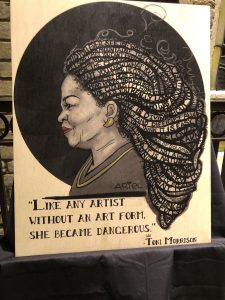
Refocus Our “We Are Nots” and I Am Not into “We Are and I Am”

The great song writer and freedom fighter in his own right, Bob Marley suggested that we need to emancipate ourselves from mental slavery, because only we can “free our minds.” In this essay, I highlight how we, Black women, can and must mitigate the double bind effect of external and internal mental anguish, by refocusing our minds, and elevating our thought processes from deficit thinking to expressed, value-driven thinking.
In my opinion, the song entitled Redemption Song and its lyrics, written and sung by the late Bob Marley and the Wailers, is one of the most prolific songs ever written. It is a song of the struggles of our African ancestors; our people, sold to traders and merchants coming from the “New” World and taken back to the New World. These egregious economic activities became the greatest socio-economic atrocities in history. The impact of this socio-economic ilk has been an ongoing pandemic that Blacks have had to live with their entire lives. Today, we have Covid-19 that is killing Blacks at a phenomenal rate, but this is not novel. Nathan Nunn and Leonard Wantcheko suggested, in their findings in their study,[1] that mistrust and external economic suppression are direct results of the biggest economic farce ever brought upon the world, the African Slave Trade. One aspect of this horrific history that does not get enough coverage is the fact that, in some instances, it was our own people who “sold” us out. This horrific part of our history and history of the Slave Trade is documented primarily in personal stories such as, My Great-Grandfather, the Nigerian Slave-Trader, The New Yorker, July 15, 2018 and When the Slave Traders Were African, Washington Post, September 20, 2019. Both narratives are written by Adaobi Tricia Nwaubani. We were plundered, robbed, sold, and taken as property, etc. Some of those who were sold could have been prevented, had it not been for the economic impact given to the African traders.
Last Friday, as we celebrated #Juneteenth and the emancipation of slaves, I could not shake my thoughts of the history of slavery and how its effects still manifest in several ways in our personal, professional, and family lives, and on our mental and emotional health. I thought, wow, we are still not free. Some of us still suffer the cruel impact of slavery and therefore, are locked in the mantra of being “mental slaves!” That’s when the Redemption Song came to mind, I started singing it. Oh, how we suffer from centuries of physical and mental oppression. Some of the physical may not be as pervasive as they once were. But, recent events such as the killing of George Floyd, and many others make us regress, back to the mental oppression and the emotional stress. The mental is often more damaging than the physical, it leads to depression, emotional stress, and physical maladies; it is cyclical! I have been crying and crying since the past couple weeks, calling my son, and crying asking him if he is okay. These past weeks have been an emotional roller coaster for millions of us, Black women, who are wives, mothers, sisters, aunts, and anyone who is a relative of a Black man or boy. My daughter told me she was having sleepless nights, worrying about her brother. The mental slavery and aguish is real even while related to such external events. Then there is the metal anguish sometimes brought on by our own deficit thinking; it’s how we think about ourselves, I call them the “WE ARE NOTs” and the I AM NOT: We [I] think we are not good enough; not smart enough; not beautiful enough; not lean enough; not tall enough; not short enough; not rich enough; not liked enough, not educated enough, etc. I have reached the pinnacle of formal education with “every degree that ever was,” as my daughter told her teacher while in elementary school. I am highly educated, with a doctorate and post-doctorate, and I am a professor of accounting, yet, I still suffer from the mental anguish brought on by students who ridicule my accent or my national origin, etc., in their student evaluations. Those micro-aggressions we experience in academia that often weighs us down, are real; they are heavy!
Yet, I need to constantly remind myself to focus and refocus these “WE ARE NOTs” and I AM NOT, turn them into the “We ARE, and I AM!” Mika Brzezinski reminds women to know their value.[2] I expand on that mantra; not only should we know our value, we must articulate our values, our culture, our beauty inside and out, showcase what we bring to this world. Each of us is unique in our own way; thus, we must emancipate ourselves from this mental slavery. Remember the words of Bob Marley, “none but ourselves can free our minds.” We need to love ourselves, so much so that we do not allow others to steal our joy and continue to oppress and suppress us with their attitudes and behaviors. What a beautiful world this would be, if we followed the core teaching of all the major socio-religious beliefs. They posit the same message: Love thy neighbor AS you love yourself. If we adhered to this, there would be no racism, no bigotry, no hatred!
[1] Nunn & Wantcheko (2011). The Slave Trade and the Origins of Mistrust in Africa. American Economic Review 101. Pg. 3221–3252
[2] Brzezinski (2011). Know Your Value: Women, Money, and Getting What You’re Worth. Weinsterin Books. New York, NY.


Liddy Scalan
Posted at 14:09h, 28 JuneYour post has the awesome Nobel laureate,Toni Morrison, right up top and begins with a contribution from the magical musician or even poet, Bob Marley. Readers immediately know they will be reading some powerful words. Thank you for putting into powerful words your thoughts and feelings about the pain oppression creates. And still you rise and we read how you and those who share your burden transcend through love. It seems outrageous that the oppressed must emancipate themselves. However it is also an amazing display of strength, this freeing oneself. I am so sorry our society forces you to overcome; I am so grateful for your inspiration and thank you for the grace you display when you share your story as a way of helping others. Your service to your fellows, especially PhD students who are people of color, is nothing short of amazing. Unlimited love and blessings for you and yours are most assuredly deserved.
Richard Stephenson
Posted at 14:23h, 28 JuneImpressive